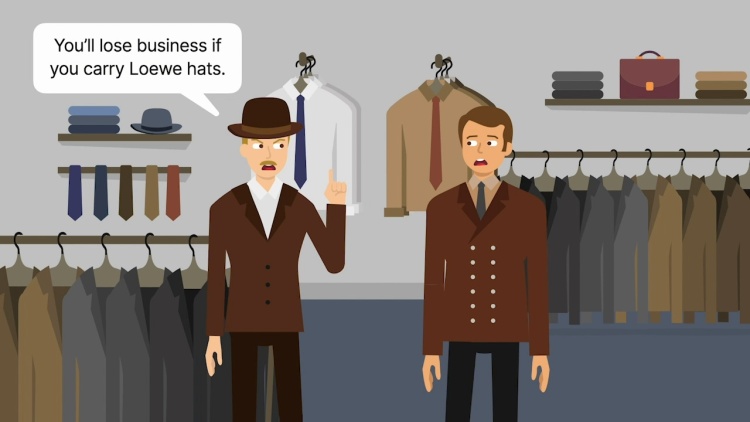Loewe v. Lawlor
United States Supreme Court
208 U.S. 274 (1908)
- Written by Rose VanHofwegen, JD
Facts
By 1901, the United Hatters Union of North America (UHU) (codefendant) had organized 70 of the 82 hat manufacturers in North America. The union had about 900 members in local unions and was affiliated with the American Federation of Labor. But Danbury, Connecticut, hat manufacturer D. E. Loewe & Company (the Danbury Hatter) (plaintiff) refused to recognize the union and did not require its employees to be members. With the labor federation’s assistance, UHU called for a strike at the Danbury factories and boycotted the hats they produced. Specifically, UHU boycotted any wholesalers and dealers that sold Danbury hats, even if they also sold hats made by other manufacturers. The Danbury Hatter sued the union and its representative Martin Lawlor (codefendant) in federal court under the Sherman Antitrust Act, alleging the boycott amounted to an illegal restraint of interstate commerce. The trial court found that the boycott was not actionable as a federal antitrust violation and dismissed the case. On appeal, the circuit court certified the question of whether the Danbury Hatter had stated a cognizable claim under the Sherman Act for the Supreme Court to decide.
Rule of Law
Issue
Holding and Reasoning (Fuller, C.J.)
What to do next…
Here's why 910,000 law students have relied on our case briefs:
- Written by law professors and practitioners, not other law students. 47,100 briefs, keyed to 997 casebooks. Top-notch customer support.
- The right amount of information, includes the facts, issues, rule of law, holding and reasoning, and any concurrences and dissents.
- Access in your classes, works on your mobile and tablet. Massive library of related video lessons and high quality multiple-choice questions.
- Easy to use, uniform format for every case brief. Written in plain English, not in legalese. Our briefs summarize and simplify; they don’t just repeat the court’s language.






